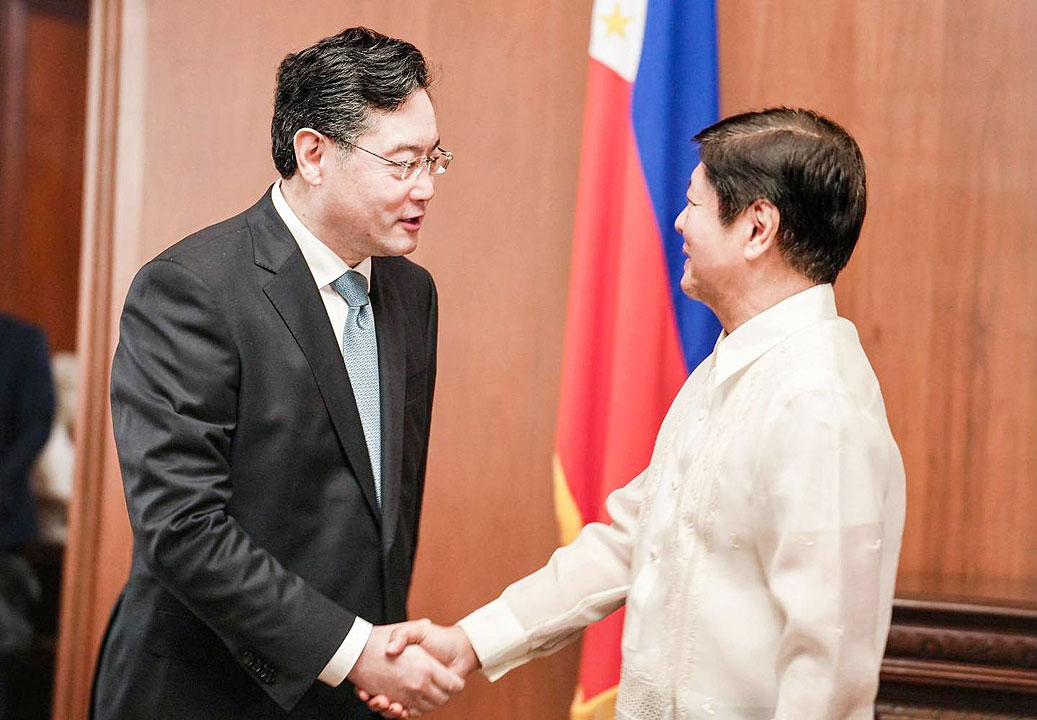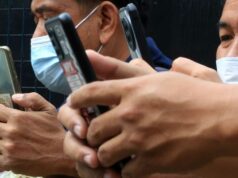Analyst: China hasn’t given up on Philippines as its partner

By Kyle Aristophere T. Atienza, Reporter
CHINESE Foreign Minister Qin Gang’s visit to the Philippines last week amid rising regional tensions showed that China sees the Philippines as a strategic partner in trying to counter American influence, an analyst said on Sunday.
“The abrupt visit of the Chinese official shows that Beijing cannot afford to lose Manila from its near-medium-and farsighted future,” Chester B. Cabalza, founding president of Manila-based International Development and Security Cooperation, said in a Facebook Messenger chat.
Mr. Marcos Jr. met with Mr. Qin on Saturday at the presidential palace in Manila, days after Chinese Ambassador Huang Xilian’s call for the Philippines to oppose Taiwan’s independence by not giving US troops access to Philippine military bases sparked debates.
“As much as possible, China wants to patch up its differences with the Philippines,” Mr. Cabalza said. “The deliberate visit allows China to persuade the Philippines to switch its foreign policy options given Manila’s security prerogative in realigning its defense ties with a traditional ally in the region.”
In a statement at the weekend, Mr. Marcos said the meeting had allowed them to “talk directly to one another and iron things out.” “Some of the pronouncements that have been made recently by our two countries and many other countries might be misinterpreted.”
The president said they talked about continuing to work on boosting the relationship between the Philippines and China, not only in the economic field but in cultural, educational and other exchanges.
Mr. Huang at a news briefing this month asked the Philippines to oppose Taiwan’s move for independence if the country “cares genuinely” about the more than 150,000 overseas Filipino workers (OFW) there.
He said the United States seeks to take advantage of the expansion of its 2014 Enhanced Defense Cooperation Agreement (EDCA) with the Philippines to interfere in the Taiwan situation “to serve its geopolitical goals and advance its anti-China agenda at the expense of peace and development of the Philippines and the region at large.”
Under the EDCA expansion announced in February, Manila is giving Washington access to four more military bases on top of five existing sites.
“The visit of Mr. Qin is also a mild reaction to Mr. Marcos’ upcoming visit to Washington,” Mr. Cabalza said, referring to the Philippine leader’s meeting with US President Joseph R. Biden at the White House on May 1.
He also noted that the Chinese official’s visit came as the Philippines and US hold their biggest military drills, which will end on April 28.
In his statement after meeting with the Chinese foreign minister, Mr. Marcos said they had agreed to establish more lines of communications “so that any event that occurs in the West Philippine Sea that involves China and the Philippines can immediately be resolved.”
“So we are currently working on that and are awaiting the Chinese response and we are confident that these issues would be worked out that would be mutually beneficial for both our nations,” he added.
‘MORE FORCEFUL’
Michael Henry Ll. Yusingco, a policy analyst, said keeping communication lines open is “just diplomatic common sense” and “cannot be touted as an achievement.” “These are all boiler plate diplomatic responses,” he said in a Messenger chat.
“What is lacking on the side of the Marcos administration is a toughness and belligerence to protect our national security — to show the other side that we too will not be swayed or dominated by any other country for whatever purpose,” he said.
He urged Mr. Marcos Jr. to be “more forceful” in clarifying to China that the Philippine government’s actions “are only motivated by protecting our national interest” and that “they should accept and respect that.”
“Otherwise, we will never have a harmonious relationship moving forward.”
Making a tougher position entails a more concerted effort to strengthen the Philippines’ defense capability, Mr. Yusingco said, “particularly our maritime defense.”
“The president must be able to demonstrate to the world that his administration is taking steps to attain this goal.”
Philippine Foreign Affairs Secretary Enrique A. Manalo on Wednesday told the Senate committee on foreign affairs the US could not invoke its Enhanced Defense Cooperation Agreement (EDCA) with the Philippines to defend Taiwan in case it is attacked by China.
“If the United States tries to invoke the EDCA, it would be inconsistent,” he said. “I don’t think they could use the EDCA because it’s quite clear what purpose EDCA activities are for.”
He issued the remark after Senator Maria Imelda “Imee” R. Marcos, who heads the committee, asked if the US could use EDCA sites to go up against China if it invades Taiwan.
Mr. Manalo said the US could invoke its Mutual Defense Treaty with the Philippines, but this would still be subject to congressional review.
“If the US were to ask us, we could not immediately take a decision unless we go through constitutional processes,” he said. “That would mean at least going through the legislative bodies.”
He said EDCA is “not aimed at any third country” and is “meant for the use of the Philippines and of course in connection with our treaty with the United States.”
National Security Council spokesman Jonathan E. Malaya this month said the Philippines adheres to the One China Policy, which recognizes Taiwan as part of China and “subscribes to the Association of Southeast Asian Nations principle of noninterference in approaching regional issues.”
EDCA was built on the 1951 Mutual Defense Treaty and the 1999 visiting forces agreement between the Philippines and US.
The main principle of the Mutual Defense Treaty is “to have collective defense,” Defense Secretary Carlito G. Galvez, Jr. told the same hearing.
“The Philippines fully subscribes to the principle of noninterference in the affairs of states and respect for sovereignty and that’s also enshrined in the UN charter which we fully subscribe to,” Mr. Manalo told senators.



